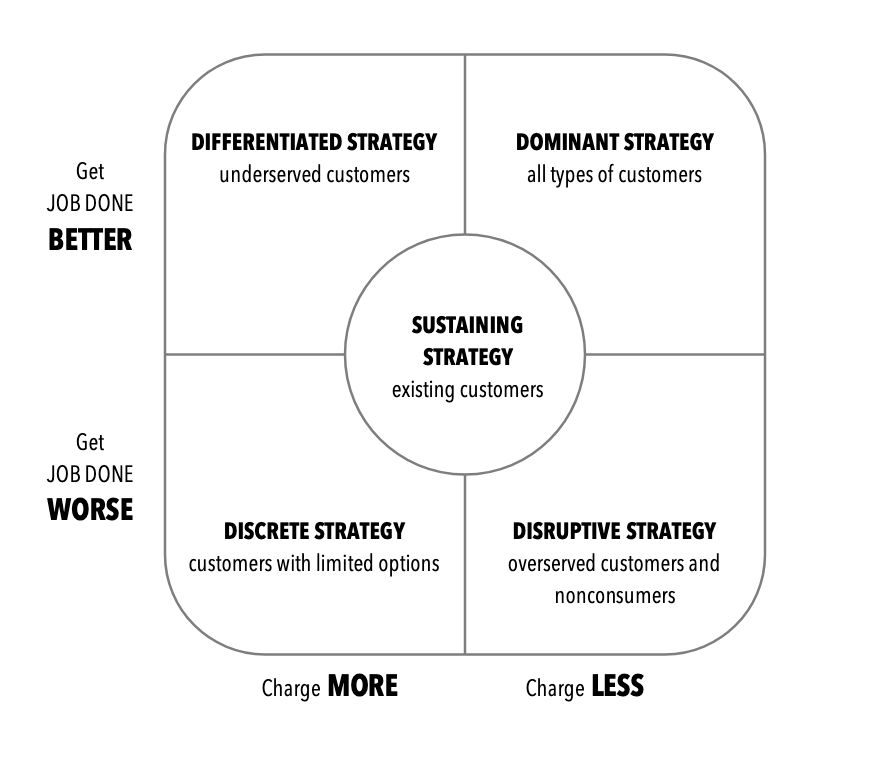
Hello {{ FNAME | Innovator }}!
Last week, we talked about why the theory behind, and terminology of, “disruption” can prove to be so divisive. This week, we’re extremely excited to share a guest perspective on Disruption from Jeroen Coelen, advisor and creator of I Want Product Market Fit who delves into how disruption can happen by creating a worse product than what’s on the market.
Here’s what you’ll find:
This Week’s Guest Article: Make shitty products to unlock new markets.
Share This: The Jobs to be Done Matrix
I want to talk to you, {{ FNAME | Innovators }}!
After guesting on nearly 50 podcasts over the past year, we’re finally biting the bullet and launching Innovate, Disrupt, or Die! The Podcast. We’ve already recorded 5 episodes and we’re looking for folks who would like to be a guest. We’ve put together a quick one-sheet, available here.
Don’t miss our latest episode:

This week, we have something special lined up. Jeroen Coelen, the creator behind IWantProductMarket.Fit, offers his perspective on disruption in his article, Make Shitty Products to Unlock New Markets. In this deep dive, which is highly complementary to our own thoughts on The Disruption Test, Jeroen offers a clear framework for strategically positioning your new product for disruption by focusing on a worse job to be done. Purposely.
Read on to learn more from the man who has mentored 1,000 founders.

Make shitty products to unlock new markets.
Most founders want to make amazing products. They believe if it’s good enough, it unlocks a big market. This is just one of many strategies.
There is another strategy most founders miss out on. Many companies with billions of revenue conquered markets like this. The matrix below is perfect to understand how that works:

Are you better or worse on the JTBD than the alternative, cheaper or more expensive?
- Source: Free Job To Be Done Book by Ulwick
Differentiated: Premium or luxury products: Expensive Mercedes, Maxed out iPhone. Swavorsky inlay gear shifting stick.
Dominant: Uber, AirBnB when it was cheaper than hotels.
Discrete: Airport sandwich, yuck. Shitty expensive hot dog in sports stadium.
Disruptive: Dollar Shave Club compared to Gilette, Google Docs compared to Microsoft Word. Primark: shitty clothing for cheap.
The interesting thing about the disruptive quadrant is that you are doing a worse job to be done on purpose.
This is what most startups miss: everyone wants to be better.
Vibe Coding is Disruptive
Take vibe coding. It offers an inferior version of hiring a proper human coder, but at a fraction of the costs.
What we are seeing now is that for particular use cases this compromise works well.
It's like how Airbnb didn't have the service of a hotel, but it was cheaper and we didn't care.
It's not about asking if vibe coding replaces normal coding. It's about understanding in which use cases it's good enough for us to accept the tradeoff.
Understanding the tradeoff
In Christensen’s book Innovator’s Dilemma, there’s a classical example when mainframe computers where only thing, in the 1990s.
All the mainframe makers wanted was to have as much storage as possible on every harddrive they put in. Harddrive in the 1970s where large. Storage initially was in single digit gigabytes.
But as engineering companies do, they optimise that. They maximise storage. Yet also, the R&D lab had a breakthrough. They now could make harddrive half the size. With their new smaller invention under their arm, they went to the mainframe makers.
They said: Look how small this harddrive is. Their only question was: how much storage does it have? ‘Well, less than your current drive’, they said responded. ‘No sale’.
But then, personal computer came about. For the personal computer, size did matter. The compromise was okay, home users required less storage anyway than mainframe makers. And for that market, this technology did work.
Can you make a shittier version of something great?
So, with this tradeoff view in mind, we see that vibe coding is an excellent example of disruption. So with your startup, instead of aiming to make a $300,000 car with inlaid diamonds, can you become a Primark of something?
Are there currently people overserved in a particular market, i.e. are their harddrives too large? Who is not buying the ‘harddrives’, where they could technically use one?
Can you make a shittier version of something great?
And remember one thing: a disruptive strategy is relative to an existing alternative. Understand what you are replacing.
One face of disruption
Disruption is a term that is used to describe many things with different nuances. This article just describes one perspective.
If you want to learn about more perspective, check out some academic content such as this literature review or this review of the concept.


Are you better or worse on the JTBD than the alternative, cheaper or more expensive?
- Source: Free Job To Be Done Book by Ulwick
Want a FREE 🤖?
Refer 3 friends to Innovate, Disrupt, or Die and you can earn a month of free access to either of our unique, highly trained custom GPTs.
This unique AI model serves as the perfect thought partner to guide your general innovation and disruption efforts. Let it become your innovation thought partner.
This GPT will guide you through evaluating your new venture idea across five critical dimensions: Desirability, Feasibility, Viability, Suitability, and Capability.
All you have to do is share your link: {{ rp_refer_url }}
So far, you’ve made {{ rp_num_referrals }} referrals. You’ll earn an awesome gift after {{ rp_num_referrals_until_next_milestone }} more referrals.








